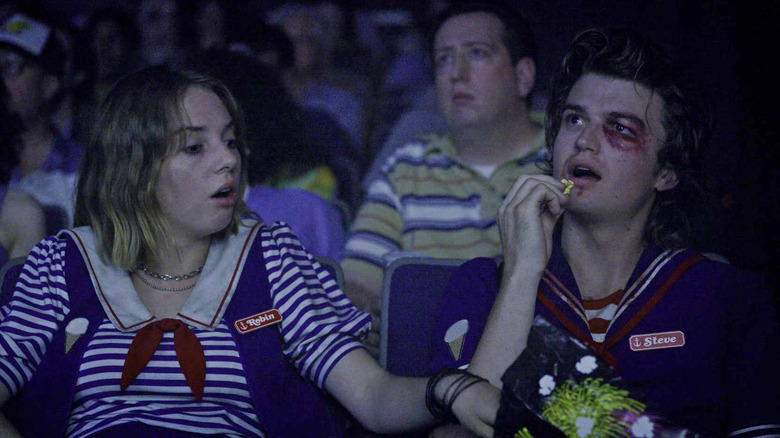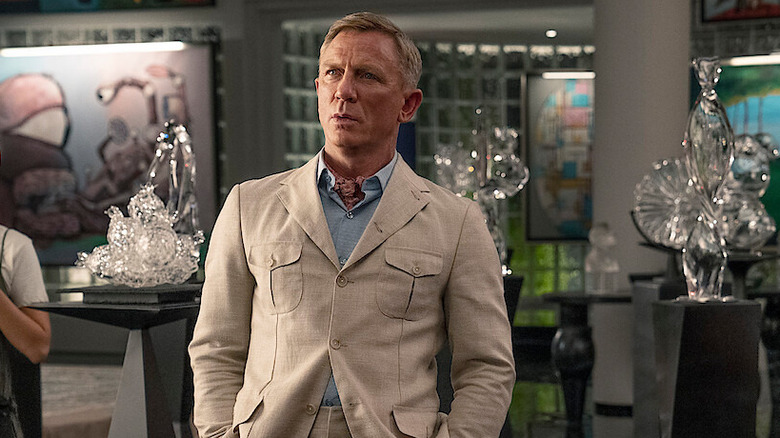Netflix Might Finally Be Forced To Put Its Movies In Theaters — Here's Why
Netflix is one of the world's biggest distributors of movies these days. While we may not generally think of it that way, it's no less true. The king of all streaming services has more than 300 million global subscribers and releases dozens of original movies annually. Netflix even generates more revenue now than the entire global box office, with virtually all of that revenue coming from subscriptions rather than ticket sales. But is that paradigm going to change? Is Netflix finally going to have to get into the business of movie theaters in a more meaningful way? It appears so.
A report from The Wrap dives into the conundrum Netflix is currently facing. CEO Ted Sarandos has remained adamant that Netflix isn't interested in participating in the box office, only using theaters very selectively — largely to qualify for awards season. However, it did top the box office earlier this year with "KPop Demon Hunters" months after the film hit the streamer, becoming the most-viewed movie in the company's history. That, among other things, has led to a situation where Sarandos and Co. may have to reconsider their position on theatrical releases.
The report also notes that a sci-fi movie titled "The Flood," which was to be directed by Zach Cregger ("Weapons," "Barbarian"), fell apart because Sarandos nixed the theatrical release Cregger wanted. Netflix wouldn't give in, so it didn't happen. This all goes back to something Sarandos said back at this year's Time 100 Summit. The executive, at the time, made his stance clear:
"Folks grew up thinking, 'I want to make movies on a gigantic screen and have strangers watch them [and to have them] play in the theater for two months and people cry and sold-out shows.' It's an outdated concept."
One way or another, Netflix will have to get in the box office game
Whether or not Sarandos believes theaters are an outdated concept is irrelevant. It's true that the box office has struggled mightily to recover since the pandemic in 2020. It's also fair to say that streaming is Hollywood's one true future, with cable TV currently dying a slow death. At the same time, there's no denying that A-list talents want to make movies for theaters. Therein lies the problem.
Cregger is directing "Resident Evil" for Sony for a theatrical release. "Stranger Things" creators Matt and Ross Duffer have now left Netflix for Paramount because that studio is going to let them make movies for theaters. Netflix wouldn't, and the company will only to continue to lose talent to rival studios over this issue. That alone might be enough to force its hand, and there's growing evidence that the streamer is caving.
AMC Theatres and Netflix just barely reached a deal after years of an impasse when it comes to the streamer's theatrical releases. It's also confirmed that the "Stranger Things" series finale will get a theatrical release, coinciding with the episode's arrival on Netflix. Not to mention, Greta Gerwig's "Narnia" is due to get an IMAX theatrical rollout next year. Cracks are beginning to show. But that's not even the biggest X factor in all of this.
Paramount is actively trying to buy Warner Bros. Without getting into the good and bad of that, this has prompted Netflix to explore a bid for WB. If that were to happen, Netflix would almost certainly have to commit to releasing movies in theaters in a meaningful way, if only to appease government regulators concerned about the harm that removing Warner Bros.' output from the theatrical industry entirely would cause.
Netflix would do theatrical releases its way
"If Netflix ends up winning Warner Bros., there's no question they will have to be in the theatrical business," Hernan Lopez, founder of consulting firm Owl & Co, explained to The Wrap. "If they end up deciding not to bid, or end up outbid, I can see them softening their stance on theatrical distribution much like they did with advertising, or with sports."
Indeed, Netflix used to be opposed to ads of any kind. Then it launched an ad-supported plan in 2022 that quickly became a huge success. Money talks, and for Netflix, keeping subscribers happy with big movies means money. If a theatrical release is make-or-break for certain directors, it might be worth giving in.
With the Warner Bros. deal, things get complicated when we consider what the ramifications of that might be. The fact is that Netflix would certainly have to agree to releasing films in theaters to get the deal approved. Does that mean it would keep the next DC movie in theaters for 45 days like other studios? Probably not. Netflix has a big issue with the exclusive window theaters enjoy, which is already much shorter than it used to be. Come what may with the WB deal, even if Netflix does cave to more theatrical releases, it'll be on its terms.
Theaters have been practically begging Netflix to release movies on the big screen in a meaningful way for years. One of the biggest issues with the box office currently is quantity. Netflix could help solve that problem, and even if it doesn't want to, the industry at large is probably going to force the company's hand, one way or another. What that looks like, in the end, remains to be seen, but the times, they are a-changin'.


